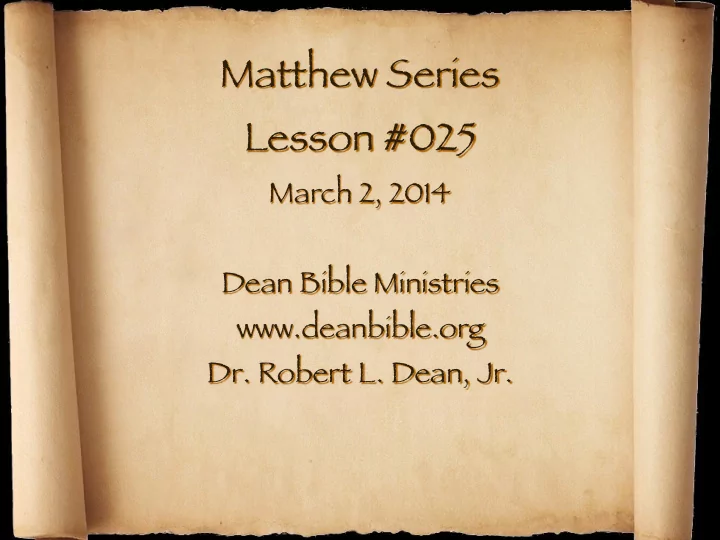

Matthew Series Lesson #025 March 2, 2014 Dean Bible Ministries www.deanbible.org Dr. Robert L. Dean, Jr.
Salt and Light Matthew 5:13
Matt. 5:10, “Blessed are those who are persecuted for righteousness’ sake, For theirs is the kingdom of heaven. Matt. 5:11, “Blessed are you when they revile and persecute you, and say all kinds of evil against you falsely for My sake. Matt. 5:12, “Rejoice and be exceedingly glad, for great is your reward in heaven, for so they persecuted the prophets who were before you.”
Matt. 5:13, “You are the salt of the earth; but if the salt loses its flavor, how shall it be seasoned? It is then good for nothing but to be thrown out and trampled underfoot by men.” NKJV
Matt. 5:13, “You are the salt of the earth; but if the salt loses its flavor, how shall it be seasoned? It is then good for nothing but to be thrown out and trampled underfoot by men.” NKJV Matt. 5:13, “You are the salt of the earth; but if the salt has become tasteless, how can it be made salty again? It is no longer good for anything, except to be thrown out and trampled under foot by men.” NASB95 Matt. 5:13, “Ye are the salt of the earth; but if the salt have become insipid, wherewith shall it be salted? It is no longer fit for anything but to be cast out and to be trodden under foot by men.” Darby Matt. 5:13, “You are the salt of the earth. But if salt loses its flavor, how can it be made salty again? It is no longer good for anything except to be thrown out and trampled on by people.” NET
Metaphor = an implied comparison Salt Disciple
Interpretations of salt 1. To create thirst. 2. To season food (kitchen metaphor). 3. To preserve food (kitchen metaphor). 4. To fertilize (agricultural metaphor). 5. Rabbis: Wisdom. 6. Purification. 7. On a lamp’s wick to increase brightness.
Matt. 5:13, “You are the salt of the earth; but if the salt loses its flavor, how shall it be seasoned? It is then good for nothing but to be thrown out and trampled underfoot by men.” NKJV
Matt. 5:13, “You are the salt of the earth; but if the salt loses its flavor, how shall it be seasoned? It is then good for nothing but to be thrown out and trampled underfoot by men.” NKJV ghv geœ gen fem sing earth, land
Option 1: Earth [ ghv geœ ] = inhabitants of the earth, synonym with “world” (basic to the seasoning, thirst, and preservative interpretations) Problem: Used 39 × in Matt; 92 × in the Gospels with synonymous usage with “land.” Option 2: Earth [ ghv geœ ] = land, soil, ground, earth (as a planet in contrast to the heavens) “salt of the earth” = salt for the land, soil, i.e., fertilizer.
Salt of the earth is understood by most positions to be salt for the earth.
The issue: Is Jesus using a kitchen metaphor or an agricultural metaphor.
Luke 14:34, “Salt is good; but if the salt has lost its flavor, how shall it be seasoned? Luke 14:35, “It is neither fit for the land [ ghv geœ ] nor for the dunghill, but men throw it out. He who has ears to hear, let him hear!”
Matt. 5:13, “You are the salt of the earth; but if the salt loses its flavor, how shall it be seasoned? It is then good for nothing but to be thrown out and trampled underfoot by men.” NKJV ghv geœ mwrai÷nw ( moœrainoœ ), aor pass gen fem sing subj make foolish, pass. be foolish; become useless. earth, land 1 Cor. 1:20; pass., to become foolish: Rom. 1:22; of salt that has lost its flavor, become tasteless: Matt. 5:13, Luke 14:34.†
Matt. 5:13, “You are the salt of the earth; but if the salt loses its flavor, how shall it be seasoned? It is then good for nothing but to be thrown out and trampled underfoot by men.” NKJV mwrai÷nw ( moœrainoœ ), aor pass aJli÷zw halizoœ subj make foolish, pass. be fut pass indic 3 foolish; become useless. sing 1 Cor. 1:20; pass., to to salt, be salty become foolish: Rom. 1:22; of salt that has lost its flavor, become tasteless: Matt. 5:13, Luke 14:34.†
Problem: Salt, NaCl, is incredibly stable, and doesn’t decay. Solution: The salt used in agriculture was a mix of many other elements, the salt could leach away from water over time, and what was left was useless.
By using an agricultural metaphor, Jesus emphasizes that a disciple should be productive, rather than nonproductive. This fits the context of rewards (vs. 12) and good works (v. 16).
Recommend
More recommend